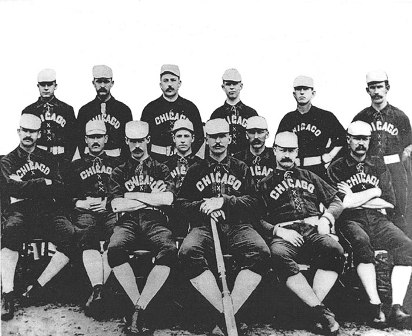In 1898, Buck Ewing, in his first season as a full-time manager told The San Antonio Light his philosophy for preparing players while his Reds trained in the Texas city:
“The regime that the Cincinnati players go through is not half as severe as the training of the pugilist. I make it a rule not to work out my men over three hours a day when we are training. With a pugilist it is the aim of his trainer to get him at his best for a certain day. To have him on edge, so as to be at his very best just as he enters the ring, the pugilist has to prepare for the event…In training a ball team you must bear in mind that there is a long siege of playing ahead of them. It won’t do to bring them to their very best to get them ‘on edge.’
“On the contrary, you must aim to have them robust and fast, and down to weight without getting them so fine that a continuous siege of playing may cause them to fall off weak.”
Ewing said he “trained hard every season since I have been in the business,” and because of that his players “do not feel that they are imposed upon.”
He said of his team:
“We have been very fortunate in having a collection of sensible, honest players. I have not found any bad feelings at any time. I have made it a practice to make every player feel that he is just as much a factor in the Cincinnatis as the oldest man.”
He said he didn’t just prepare his players physically:
“The baseball world must know that it is pretty hard for players even with years of experience to withstand the influence of the taunts of the crowd. It is one of the first lessons, I believe should be taught players, to turn a deaf ear to shouts of the attendance. Our players are especially strong in this point, although occasionally rooters do get them unbalanced.”
The Reds manager said, “No captain or manager, be him ever so great, can make a team win ball when there is lack of harmony.”
“If there are two or three men who are not speaking to each other, and who are continually talking about shirks and grumbling and muttering, it is impossible for them to play good ball. They may capture a game now and then, but for steady, reliable work they cannot be depended upon. Every man in the team should stand ready at any moment to do his best to make his nine win.”
And what was the biggest danger for the harmony of a team?
“Harsh language has done more to ruin prospective players than any other cause.”
Ewing said his club “kept uppermost in their mind,” that “there should be but one head and that he should do the ordering and they the obeying.”
That “idea” he said, portended good things for Cincinnati’s prospects in 1898:
“I have never been in a team where the players carried out this idea and were as harmonious in their work as the present one.”
The 1898 season was Ewing’s most successful as a manager—his Reds won 92 games –but finished third in the National League.



Leave a comment